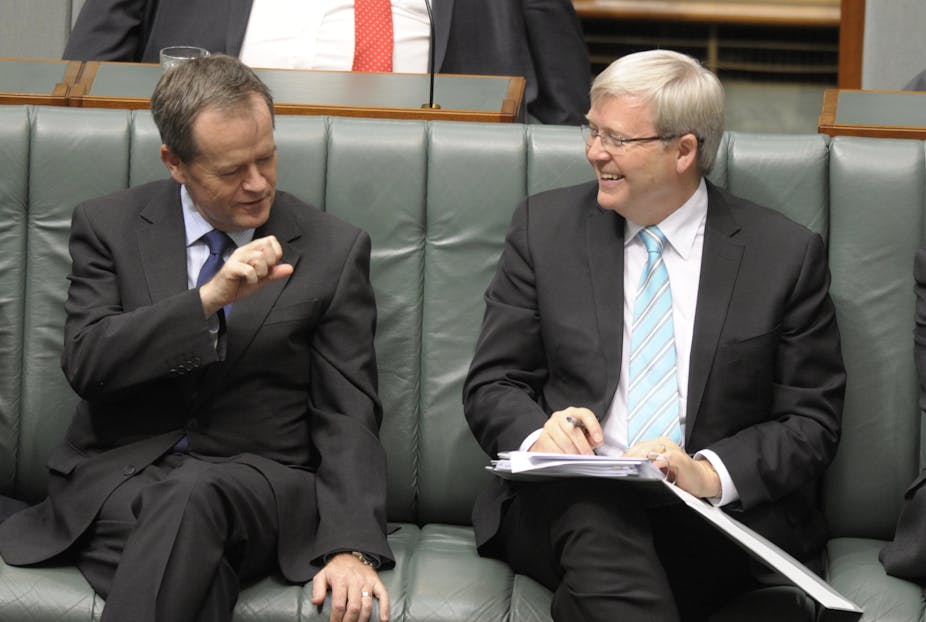The decision by the Labor caucus to minimise the electoral damage in September and return Kevin Rudd to the party leadership was short-sighted and ultimately self-destructive.
More importantly, it operated to confirm the damaging sense, growing over recent decades among the Australian public, that politicians act cynically in their own interests. And with his decision to not move a motion of no confidence in the new administration, opposition leader Tony Abbott made his own contribution to the growing problem of voter alienation.
“They’re just in it for themselves” is the sentiment which best captures how the average voter currently thinks about their democratically-elected political representatives. Why did 57 caucus members vote to reinstate Rudd as prime minister on Wednesday? Because they were worried about their own seats – and therefore their jobs – come the election.
Labor powerbroker Bill Shorten provided the public rationale for the caucus decision half an hour before the vote. He reminded Labor parliamentarians that the main game was the September election, and the primary objective was keeping Abbott out of Kirribilli House.
The polls had long said that Labor would not achieve that primary objective while led by Julia Gillard. The only alternative was Rudd. It was a no-brainer.
There is no evidence that Shorten was not being genuine in that speech. His passionate defence of his party’s policies against those of the opposition may even be admirable. But in equating the interests of his party with the interests of the nation, he – and the Labor caucus – made the gravest of political mistakes for the second time.
The mistake was to ignore the question which for decades now has been nibbling at the integrity of Western parliamentary democracies. How can the relationship between state and citizen be repaired?
For the past 30 years, the relationship between state and citizen has been in what seems a permanent decline. Governments, with the assistance of journalists in the mass media and increasingly meek and ineffectual parliaments, have imposed wave after wave of significant, way-of-life-changing reform on voters, who rarely get a say on its implementation.
Sometimes that reform is genuinely in the public interest, though the public may not know it yet. A more expansive immigration program and a scheme to reduce carbon dioxide pollution are instances in Australia.
However, there are some occasions that reform is demonstrably not in the public interest, including the removal of workers’ protections, the replacement of income and profit-based taxes by consumption taxes, and the pursuit of budget surpluses over public infrastructure.
But only rarely are voters offered a genuine choice between alternatives. More often than not, the major parties agree at the level of fundamental philosophy, so that the choice available to voters is akin to a customer who prefers yellow paint being confronted by a shelf displaying different shades of brown.
The result is an increasingly cynical electorate which becomes ever more despondent about the prospect of turning up to the local primary school every three years to vote. Last year the Lowy Institute found that only 39 per cent of young Australians were prepared to say they backed democracy unequivocally. What to do about this cynicism is the key question at the heart of democratic governance in Australia today.
This is not an argument for base populism: not for running opinion poll-driven administrations which pander as much to majority prejudice as they do to genuine public interest needs. Rather, it is an argument for governments - and those politicians who inhabit them - to take much more seriously their responsibilities as democratic representatives of the people.
That is why the panicked decision of the Labor caucus must be condemned in the strongest possible terms. Yes, Westminster conventions allow it. Yes, Labor was facing a probable annihilation under Gillard. But no, political parties should not be allowed to put their own private interests before the broader public good in a way that further encourages dangerous voter cynicism.
One does not need to be a supporter of Abbott or the Coalition to support a no confidence motion. It is enough to be a supporter of democratic renewal. The voting public were entitled to have the new administration tested by the cross-benchers in their representative institution.
However, despite three years of running perhaps the most negative and cynical opposition in modern Australian political history, Abbott baulked at the final chance to move a motion of no confidence in the new Rudd administration. In this way, he merely participated in what increasingly appears to be, to borrow his own phrase, a “conspiracy of the parliament against the people”.
In any case, this latest switch will not help Labor. One of the expressions of contemporary voter cynicism is that we prefer the idea of the leader who isn’t: when Rudd was prime minister, Gillard was preferred; when Malcolm Turnbull was opposition leader, Joe Hockey was popular.
Now we prefer Rudd and Abbott to Gillard, and Turnbull to Abbott. Anger at the self-serving nature of Wednesday’s decision will soon overwhelm any honeymoon popularity Rudd attracts.

